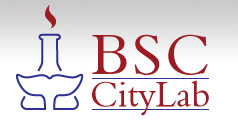 |
||||
|
||||
 |
||
| Home > About BSU CityLab > Purpose and History | ||
Purpose and History |
||
|
The following paragraphs provide an overview of BSU CityLab, including the purpose and goals of the programs. Related pages of interest include:
CityLab at Bridgewater State University (BSU) is a science outreach program in biotechnology for classroom teachers and their students. It was first established as one of several satellites of the original CityLab program at the Boston University School of Medicine (BUSM). Like the Boston University model, the programs offered at BSU CityLab provide hands-on, inquiry-based laboratory activities for the enhancement of teaching and learning in science and math. The K-12 education community and professionals in higher education have expressed great concern about the need to improve student preparation in these subjects and about the urgency of attracting and keeping young people in science and technology careers. Like BUSM CityLab, BSU CityLab and other CityLab sites are responding to these challenges by offering programs that support student participation and empower teachers utilizing the principles of Progression of Inquiry (Bergethon, 1999) and the 5E Learning Cycle (Trowbridge, Bybee, and Carlson, 2000).
For more than a decade, students and teachers from area middle and high schools have visited BSU CityLab’s state-of-the-art facility where they have participated in exciting and authentic laboratory experiences. The programs provide an introduction to advanced techniques and equipment used in real biotechnology research laboratories, including micropipettes, spectrophotometers, and gel electrophoresis equipment. Each program module is aligned with many state and national learning standards in math, science and technology. Students are exposed to multidisciplinary content, laboratory equipment of the kind they have seen on their favorite television crime shows, the feeling of being on a college campus and the possibilities of career choices well within their reach. The science content in the BSU CityLab modules is primarily modern cellular and molecular biology with a focus on biotechnology and health. Topics investigated include the inheritance and molecular basis of disease, such as sickle cell syndrome, protein and DNA fingerprinting, the concept of an assay (protein quantification), gene transfer and expression, cell division and metabolism, cell structure and function, forensic investigation, and the polymerase chain reaction. Classroom teachers who accompany their classes for in-house programs take an active role in teaching the modules. Those who are themselves sufficiently trained may opt to perform the modules in their classrooms through lending labs. BSU CityLab supports teacher professional development in the modules and pedagogy as well as in content areas related to biomedicine and biotechnology through workshops and graduate level courses. Funding for the establishment of BSU CityLab and development of curriculum modules has been provided, in large part, by a Science Education Partnership Award (SEPA) from the National Institutes of Health (NIH). A three-year Phase I SEPA grant was awarded in 2000. The project, entitled BSC CityLab Satellite: Biotech for Students and Teachers Phase I (RR15600, 2000-2004), was funded through a fourth year with a twelve-month no-cost extension. When funding ended, BSU CityLab continued to offer its science outreach programs for students and teachers, relying for financing on established partnerships with local school district. Building upon the success of the Phase I grant, BSU CityLab was awarded Phase II funding in 2005 (name of project?) to expand the partnerships and disseminate the curriculum modules developed in Phase I. An additional no-cost extension will enable the printing and distribution of the curriculum modules, along with an extensive redevelopment of the website, both of which are scheduled to be completed by the end of August 2008.
This page was updated on June 17, 2008. |
 |
|


